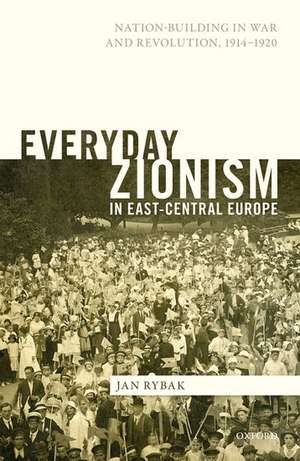Everyday Zionism in East-Central Europe: Nation-Building in War and Revolution, 1914-1920
Autor Jan Rybaken Limba Engleză Hardback – 5 aug 2021
Preț: 537.74 lei
Preț vechi: 614.82 lei
-13% Nou
Puncte Express: 807
Preț estimativ în valută:
102.90€ • 107.22$ • 85.20£
102.90€ • 107.22$ • 85.20£
Carte disponibilă
Livrare economică 03-08 martie
Preluare comenzi: 021 569.72.76
Specificații
ISBN-13: 9780192897459
ISBN-10: 0192897454
Pagini: 384
Dimensiuni: 162 x 240 x 26 mm
Greutate: 0.72 kg
Ediția:1
Editura: OUP OXFORD
Colecția OUP Oxford
Locul publicării:Oxford, United Kingdom
ISBN-10: 0192897454
Pagini: 384
Dimensiuni: 162 x 240 x 26 mm
Greutate: 0.72 kg
Ediția:1
Editura: OUP OXFORD
Colecția OUP Oxford
Locul publicării:Oxford, United Kingdom
Recenzii
Recommended
In this impressive and persuasive book, Jan Rybak carefully demonstrates how Zionist activists positioned themselves to become leaders of the "Jewish nation" in East Central Europe during and immediately after World War I... Providing new and original insights, Rybak has written a profoundly original analysis of one of the most interesting issues of early twentieth century Jewish history: how the notion of a Jewish nation became paramount in Jewish and non-Jewish circles.
Why would people believe that joining a national movement would make their lives any better? What concrete nationalism offers to individuals, engaging them in such a collective project and gigantic collective commitments? Jan Rybak's thought-provoking book answers these questions by analyzing the Zionist movement in East-Central Europe in one of its critical historical periods...: WWI. Through thorough analysis, Rybak demonstrates the significant convening power of Zionist activists in solving the everyday but urgent needs of ordinary Jews... Jan Rybak's book... is an extraordinarily important contribution to scholarship that illuminates some of the key topics of twentieth-century nationalism, minority rights, citizenship and transnational history.
Everyday Zionism tells a gripping story of local activism and survival as Empires clashed in a brutal war across Central and Eastern Europe. While imperial bureaucrats increasingly turned a blind eye to the suffering of the Jews, Zionist women and men improvised a range of inventive, opportunistic, and ideologically flexible strategies, organizing food provision, child welfare and even self-defense units against attacks by local anti-Semites. Based on a remarkable range of research in several languages, Rybak's story vividly illuminates how quotidian practices, not ideologies, decisively shaped Zionist movements across Eastern Europe.
Thoroughly researched, analytically incisive, and intelligently presented, this book makes a number of truly significant contributions to understanding the history of Jews in east central Europe during the twentieth century, including original insights into Jewish political behavior and patterns of violence against Jews in the region.
Jan Rybak's book, Everyday Zionism in East-Central Europe: Nation-Building in War and Revolution, 1914-1920, offers important new research on Zionism during and after World War I.
This is a strong book especially when you consider the bibliographic resources brought to bear...Rybak has done a lot by creating a synthetic portrait of the Jewish world from the Baltic to the Black Sea and from the Dnieper to the Oder.
In this impressive and persuasive book, Jan Rybak carefully demonstrates how Zionist activists positioned themselves to become leaders of the "Jewish nation" in East Central Europe during and immediately after World War I... Providing new and original insights, Rybak has written a profoundly original analysis of one of the most interesting issues of early twentieth century Jewish history: how the notion of a Jewish nation became paramount in Jewish and non-Jewish circles.
Why would people believe that joining a national movement would make their lives any better? What concrete nationalism offers to individuals, engaging them in such a collective project and gigantic collective commitments? Jan Rybak's thought-provoking book answers these questions by analyzing the Zionist movement in East-Central Europe in one of its critical historical periods...: WWI. Through thorough analysis, Rybak demonstrates the significant convening power of Zionist activists in solving the everyday but urgent needs of ordinary Jews... Jan Rybak's book... is an extraordinarily important contribution to scholarship that illuminates some of the key topics of twentieth-century nationalism, minority rights, citizenship and transnational history.
Everyday Zionism tells a gripping story of local activism and survival as Empires clashed in a brutal war across Central and Eastern Europe. While imperial bureaucrats increasingly turned a blind eye to the suffering of the Jews, Zionist women and men improvised a range of inventive, opportunistic, and ideologically flexible strategies, organizing food provision, child welfare and even self-defense units against attacks by local anti-Semites. Based on a remarkable range of research in several languages, Rybak's story vividly illuminates how quotidian practices, not ideologies, decisively shaped Zionist movements across Eastern Europe.
Thoroughly researched, analytically incisive, and intelligently presented, this book makes a number of truly significant contributions to understanding the history of Jews in east central Europe during the twentieth century, including original insights into Jewish political behavior and patterns of violence against Jews in the region.
Jan Rybak's book, Everyday Zionism in East-Central Europe: Nation-Building in War and Revolution, 1914-1920, offers important new research on Zionism during and after World War I.
This is a strong book especially when you consider the bibliographic resources brought to bear...Rybak has done a lot by creating a synthetic portrait of the Jewish world from the Baltic to the Black Sea and from the Dnieper to the Oder.
Notă biografică
Jan Rybak studied history at the University of Salzburg and received his PhD from the European University Institute in Florence in 2019. He held visiting and research fellowships at POLIN Museum of the History of Polish Jews and the Jewish Historical Institute in Warsaw, New York University, and the University of Illinois at Urbana-Champaign. He taught as an external lecturer at the University of Salzburg and is currently a Postdoctoral Research Fellow at the University of York.
